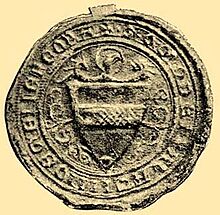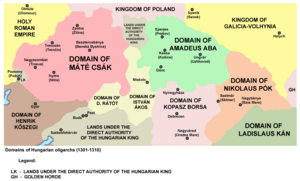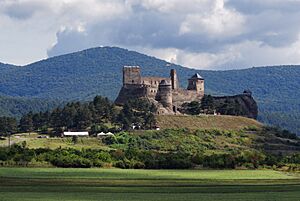Amadeus Aba facts for kids
Quick facts for kids
Amadeus Aba
|
|
|---|---|

Seal of Amadeus Aba
|
|
| Palatine of Hungary | |
| Reign | 1302–1310 |
| Predecessor | several others |
| Successor | James Borsa |
| Died | 5 September 1311 Kassa, Hungary (today Košice, Slovakia) |
| Noble family | gens Aba |
| Issue | John Nicholas III David II Ladislaus II Amadeus II Dominic Catherine |
| Father | David I |
Amadeus Aba (also known as Amade Aba) was a very powerful lord in the Kingdom of Hungary during the late 1200s and early 1300s. He acted almost like an independent ruler over the northern and north-eastern parts of the kingdom. These areas are now parts of Hungary, Slovakia, and Ukraine.
Amadeus held important jobs for the king many times. He was the Palatine (a top official, like a prime minister) several times between 1288 and 1310. He was also a judge royal (a chief judge) twice. Amadeus Aba was killed in the city of Kassa by citizens from the city.
Contents
Amadeus Aba's Family and Early Life
Amadeus Aba was the son of David I, who was part of the Aba family, a powerful clan. His father was a leader called an ispán (a count or head of a county). Amadeus had three siblings: Finta, who was also a Palatine, Peter, who was a Royal Judge and a close friend of Amadeus, and a sister who married Simon from the Kacsics family.
Amadeus and his wife had at least six sons and one daughter. His oldest son was John. Two of his sons, Nicholas III and David II, died in a big battle called the Battle of Rozgony. Amadeus's only daughter, Catherine, married Maurice Csák. She later became a nun, which made Amadeus angry. He even put Maurice in prison for a short time.
In 1278, Amadeus fought in the Battle of Marchfeld. He was part of the Hungarian King Ladislaus IV's army, which helped King Rudolph I of Germany. In 1280, Amadeus became the leader of Hermannstadt (today called Sibiu in Romania). This meant he was the royal officer in charge of the Transylvanian Saxons, a group of German settlers.
King Ladislaus IV made Amadeus a judge royal in 1283. In 1285, Amadeus successfully fought against the Mongols. They were attacking the north-eastern parts of Hungary. Amadeus also received land and special rights in Poland from King Wladyslaw Lokietek.
A Powerful Leader
After 1288, Amadeus Aba became Palatine for the first time. He held this important job until 1289, when he became judge royal again. Later, he had a disagreement with King Ladislaus IV, and the king's army took one of his castles, Tokaj.
After King Ladislaus IV died in 1290, Amadeus became a strong supporter of the new King, Andrew III of Hungary. King Andrew III appointed him Palatine again. Even though the king sometimes appointed other Palatines, Amadeus often continued to use the title. After 1297, Amadeus was one of King Andrew III's most important supporters. They even made a formal agreement in 1298.
When King Andrew III died in 1301, there was a fight over who would be the next king. Some powerful lords supported Wenceslaus III of Bohemia, the prince of Bohemia. But Amadeus Aba and others supported Charles, who was from the Angevin family. Charles tried to take Buda, the capital city, in 1302, but he didn't succeed. Charles often visited Amadeus Aba at his fortress in Gönc. In 1304, people from Szepes (Scepusian Saxons) and Kassa, who supported Wenceslaus, tried to attack Amadeus's main castle, Gönc, but they failed.
Later, Wenceslaus left Hungary in 1304. Amadeus then made an agreement with Charles and Duke Rudolph III of Austria against Wenceslaus's father. In 1304 and 1305, Amadeus also helped Duke Władysław of Cuiavia fight against King Wenceslaus II. This shows that Amadeus made his own decisions about foreign policy, just like other powerful lords in the kingdom. A historical book called the Illuminated Chronicle said that Amadeus only called Charles his king "with words but not with deeds." This means he didn't always follow Charles's orders.
Amadeus Aba was at a meeting in Rákos in 1307 where Charles was confirmed as the rightful king. He was also there when Charles was officially declared king in Pest in 1308. In 1308, Amadeus became the head (ispán) of Szepes county. He was also present when King Charles was crowned in Buda in 1309. After that, Amadeus helped the king and Ladislaus Kán, another powerful lord. Ladislaus Kán promised to give the Holy Crown of Hungary to the king.
Around May 1310, King Charles took away Amadeus's titles. Amadeus was then called "former palatine" in royal documents. During that year, Amadeus took over several castles. He wanted to control the city of Kassa, but the citizens fought back. They killed Amadeus in a fight on September 5, 1311. Two of his sons, Amadeus II and Dominic, were captured along with 45 other family members and followers.
Amadeus Aba's Territory
Amadeus and his brother, Finta, inherited Nevicke (now Nyevickoje, Ukraine) from their father. Amadeus built a castle there. They might have also inherited Szokoly (now Sokoľ in Slovakia). Amadeus's territory grew bigger over the late 1200s. In 1288, King Ladislaus IV gave him Ung County, so he controlled the royal lands there until he died. Around 1300, he got Boldogkő Castle and Gönc. Later, he also held Regéc. In 1310, he took over Lubló (now Stará Ľubovňa in Slovakia) and Munkács (now Mukachevo in Ukraine).
By 1311, Amadeus ruled several counties: Abaúj (from his castles in Abaújvár and Gönc), Zemplén, Ung, Bereg, and Szepes. He also had influence in parts of Borsod, Gömör, and Szabolcs counties.
Amadeus acted like a king in his own territory. For example, he gave land and noble titles to his followers. He ran his lands from his castle in Gönc. He also took over the job of judging cases in his area. He had his own court of justice in Vizsoly. Amadeus also unfairly charged taxes and built castles without the king's permission. He appointed his own castle commanders. Amadeus had his own court, where he chose officials like chancellors, notaries, judges, and even a "Judge royal," just like the king's court.
He controlled trade and businesses in his area. He often bothered and pressured town markets and traders, especially those in Kassa. Local nobles were forced to promise loyalty to the Aba family. In 1302, his soldiers even took the property of a local noble. They put the noble in prison and threatened him to make him give up his family's land ownership papers.
Historians say that Amadeus Aba was a "loyal oligarch." This means he was a very powerful lord who controlled a large area, but he usually stayed loyal to the kings. He only rebelled once, in 1288, when King Ladislaus IV was not popular.
After Amadeus died, King Charles's representatives helped make an agreement between Amadeus's wife, sons, and the town of Kassa. The agreement said that the Aba family had to leave two counties and let the nobles in their lands freely join King Charles. This was the end of the Aba family's independent rule in North-East Hungary.
However, Amadeus's sons soon joined forces with Matthew III Csák, who was the most powerful lord in the kingdom, against the king. But Amadeus's sons could not keep their father's power. After they lost the Battle of Rozgony (now Rozhanovce in Slovakia), their territory fell apart. Other powerful families took over their castles and lands.
Images for kids
See Also
- Hungarian oligarchs
 | John T. Biggers |
 | Thomas Blackshear |
 | Mark Bradford |
 | Beverly Buchanan |




